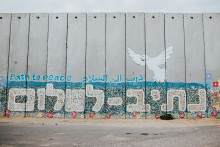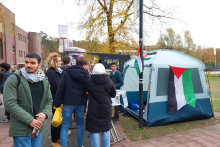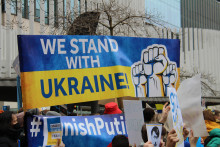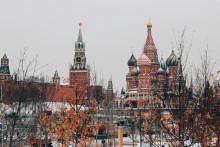Why did you decide to sign the petition ‘Dutch higher education in solidarity with Palestine’?
Suzan Bayhan: ‘I find the acts of the Israeli state in Palestine as a severe human rights violation, and I have difficulty in understanding how this state of affairs can continue for such a long time. I think widespread ignorance of this reality plays a role in the suffering and plight of the Palestinian people. I simply wanted to state that I see the Palestinian struggle and felt the need to show my solidarity with Palestinian people, colleagues, students who have been suffering from this decades- and generations-long injustice. Also, I struggle to understand how the occupation is reduced to a “conflict” between two equal sides or a battle of two religions. The unequal power relations are apparent in the case of Palestinian-Israeli relations.’
Why do you think you are the only UT researcher (so far) who signed the petition?
‘In some countries, it is seen as taboo to criticize Israel. In the US, for instance, the academics lending their support to Palestine or condemning Israel for human rights violations might be at risk of dismissal. I believe this is not the case with the Netherlands. But, as I am still relatively new to the academic culture (beyond research) here, I am not able to give a satisfactory answer to this question.’
Is the conflict in Israel personally important to you? Do you know colleagues or students who are suffering as a result of it?
‘Yes, it is important to me. I believe every human being has a right to live in peace, freedom, and liberty. I had a Palestinian MS student a few years ago at TU Berlin. It was quite a challenge for him to travel to his home during vacations because of the Israeli blockade of his town.’
Does the conflict play a role when you are in contact with colleagues/students from Israel?
‘I have not yet worked with anyone from Israel. But, the person’s country of origin should not be relevant. For example, my being an academic of Turkish origin does not mean that I am siding with all the acts of the Turkish state. I must say that I have so far met many Israeli colleagues who acknowledge the suffering of the Palestinians and severe human rights violations of the Israeli state. That being said, if I had the choice, I would prefer not to work with people and institutes who exhibit unethical behavior, be it supporting apartheid regimes or discriminating against a group of people.’
Do you believe that the University of Twente (and other Dutch universities) should boycott Israeli academic institutions? Why?
‘I have been involved in an initiative called Academics for Peace which was formed to draw attention to the state violence in the cities of Turkey predominantly populated by the Kurdish population. We have been discussing the responsibilities of academics to society and how repressive regimes can be challenged in our space of action, namely in academia. Academic boycott is one such option that seems to have worked in South Africa. Scholars like Ilan Pappe, an Israeli historian, believe that a European boycott is particularly important as it gives a clear message to Israeli academics who want to be part of the European academy. How to implement an academic boycott is not an easy question, but there are many social scientists and activists working on it.’
Do you think there is a solution to this conflict? And do you believe people are contributing to it by signing the petition?
‘I think as the international community we should listen to Palestinians and Israelis and how they want to end this injustice and live together in peace. Towards that solution, an urgent first step is to end the occupation and constant suffering of the Palestinians. The peace process might be a lengthy one. But, every single act of solidarity is valuable. For instance, if our Palestinian students at the UT feel that they are not alone and would feel hopeful about their future, then it is a contribution.’







